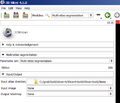2012 Summer Project Week:Atlas based segmentation for head and neck
Background
3D models with labeled structures of interest must be created for radiation therapy patients to create a treatment plan. Manual segmentation of structures is time consuming and must be done by trained doctors or anatomists. We explore an automated method using an atlas of labeled scans of other patients to produce labels for the new unlabeled scan.
Key Investigators
- MIT: Amelia Arbisser, Polina Golland
- MGH: Nadya Shusharina, James Shackleford, Greg Sharp
Objective
Automatically segment structures in the head and neck using a multi-atlas-based segmentation method.
Approach, Plan
Starting from an atlas of CT scans with the structures of interest already segmented, we register those images to the CT scan of a new patient. Then we use a voting method to determine a single label for the structure from the transformed labels from each of the atlas images. We will implement a multi-atlas-based segmentation tool in Plastimatch to explore optimal combinations of registration and voting methods.
Progress
We have run experiments on a set of sixteen patients, segmenting the brainstem and parotid glands. We used a diffeomorphic demons registration followed by a voxel-wise label fusion method, where label vote weights from each atlas image were determined by the difference in intensity and distance from the atlas structure boundaries. We are now focusing on developing the tool for Plastimatch. We have designed the tool and have implemented the majority of the pipeline, including registration and weighted voting, assuming a specific directory structure.
Delivery Mechanism
This tool will be add to Plastimatch and then Slicer as a commandline module.


